- Blog
- Personalization
- Search
- 11 min read
How to Personalize Search Experiences Using Experro?
Published
23 May 2025Updated
16 February 2026

core insights box
- eCommerce personalized search enhances user experience by delivering faster, more relevant results.
- AI and real-time data are central to creating truly personalized and customized search journeys.
- Balancing relevance with product variety is key to helping customers discover new options without restricting their exploration.
- Experro combines smart merchandising, and eCommerce search personalization in one platform to drive better outcomes.
Not all search bars are created alike - some are smart, some are just... bars.
In today's digital landscape, delivering generic search results is no longer sufficient. Consumers expect eCommerce search personalization and tailored experiences that resonate with their behaviors and preferences.
This is where product search personalization effects come into play, revolutionizing how users interact with digital platforms.
By leveraging eCommerce personalized search technologies, online retailers can offer more relevant, efficient, and engaging search experiences.
In this blog, we'll delve into the intricacies of search personalization, its benefits, challenges, and how platforms like Experro are leading the charge in this domain.
Come on, let’s learn about “what is personalized search?” next.
What Is Search Personalization?
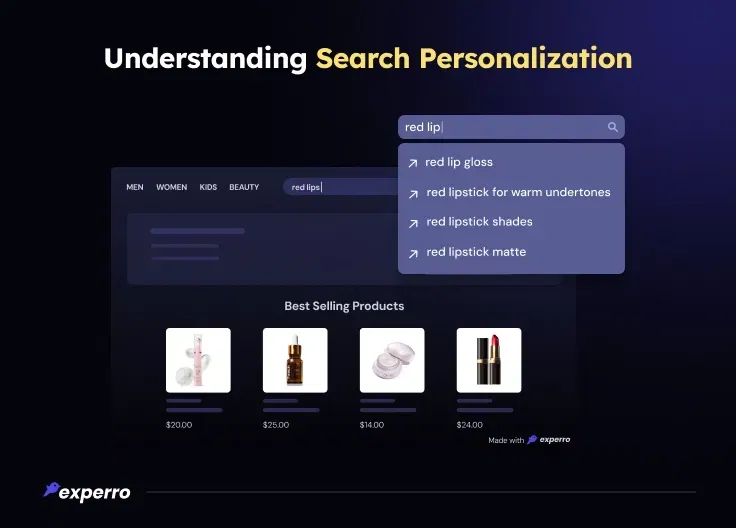
Search personalization refers to the process of customizing search results based on individual user data. This data includes past behaviors, preferences, location, and device usage.
Unlike traditional search methods that present the same results to all users, personalized search in eCommerce aims to deliver content most relevant to everyone.
Personalized tools in eCommerce search experiences and personalization significantly enhance user experience by cutting down the time and effort shoppers spend finding the products or information they want.
Moreover, online search personalization using machine learning continuously learns and adapts to user behavior through eCommerce analytics.
This dynamic adaptation is crucial for the entrepreneurs in today's fast-paced digital environment, where user expectations are constantly shifting.
How Does eCommerce Personalized Search Work?
Personalized search in B2B eCommerce collects and analyzes user data to tailor search results accordingly.
The process of personalized search involves several key components:
- Data Collection: Gathering information on user behavior, including search queries, click-through rates, purchase history, and browsing patterns to optimize conversion rates.
- User Profiling: Creating detailed user profiles considering preferences, interests, and behaviors.
- Machine Learning Algorithms: Utilizing algorithms for predictive customer analytics and delivering content that aligns with the user's profile.
- Real-Time Processing: Implementing natural language search personalization in real-time enables instant adaptation to user behavior, ensuring that the most relevant results are consistently presented.
By integrating these components, businesses can personalize the search experience that not only meets but anticipates user needs.
A report reveals that personalized search for eCommerce can increase conversion rates by up to 50% in U.S. eCommerce stores.
People often lack an understanding of how search personalization differs from traditional search. So, let’s dive into the differences in the next section.
AI-Powered Search Personalization vs. Traditional Search
While traditional search methods provide uniform results to all users, personalization in search tailors the experience to preferences. This distinction is crucial in enhancing user satisfaction and engagement.
| Feature | Traditional Search | Personalized Search |
|---|---|---|
| User Experience | Generic | Tailored to individual search queries and preferences |
| Relevance of Results | Uniform across users | Customized based on user behavior |
| Engagement Levels | Moderate | Higher due to relevance |
| Conversion Rates | Variable | Increased through targeted content |
| Adaptability | Static | Dynamic and evolves with user intent |
Understanding these differences underscores the importance of implementing eCommerce search personalization to stay competitive in today's market.
Now, let’s check out some eCommerce personalized search examples in the next section.
What Are the Examples of Personalized Search in Action?
Let’s explore some real examples of how personalized site search transforms the online shopping experience.
1. Product Recommendations Based on Browsing History
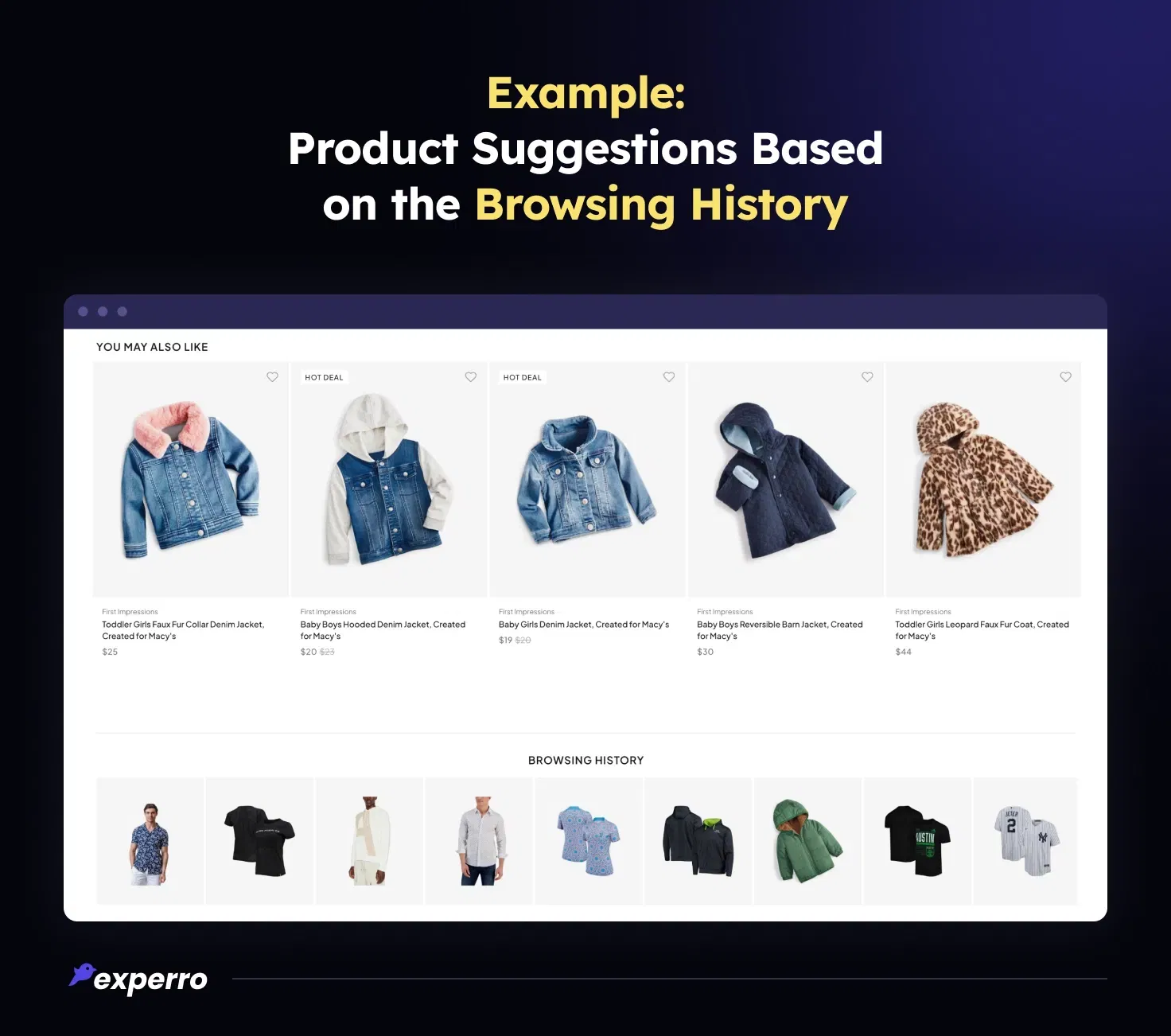
The image shows a “Browsing History” section that displays recently viewed items, including kids' outfits and jackets.
Profile-based recommendations and the personalized blocks help users pick up where they left off, offering a seamless and intuitive shopping experience. This also comes under Google search personalization.
By reminding users of their previous interests, it increases the possibility of conversion and builds a more tailored journey. It's a smart way to re-engage visitors without feeling intrusive. You can easily apply search history personalization techniques with Experro’s personalized search platform.
2. Location-Based Search Results

The banner displays winter fashion recommendations such as coats and puffers, specifically tailored for users in London. Because the system detects the user’s location as London, it suggests products suitable for the colder climate there.
This location-based personalization helps deliver relevant content, timely recommendations that improve user engagement and increase the chances of conversion.
By aligning product suggestions with local weather conditions, the experience feels more intuitive and useful for the shopper.
3. Dynamic Sorting Based on User Preferences
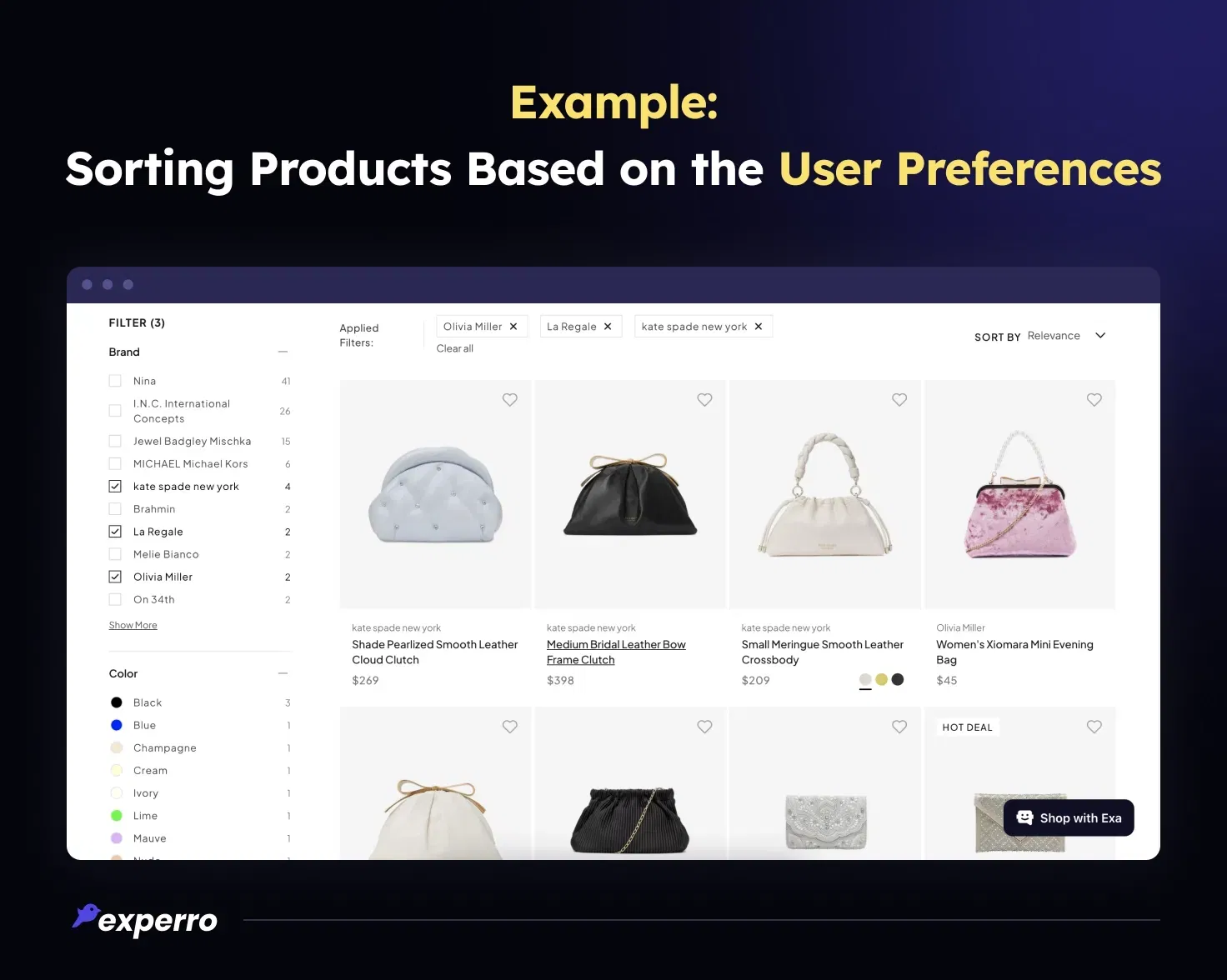
This image shows how users can dynamically sort products based on their preferences like brand, color, price, and more.
By organizing items through product taxonomy and offering flexible sorting options, shoppers can easily customize their browsing experience to find exactly what they want faster.
Whether they prefer a specific brand or a favorite color, the platform adjusts the product order accordingly, making the search smoother and more personalized.
4. Personalized Autocomplete Suggestions
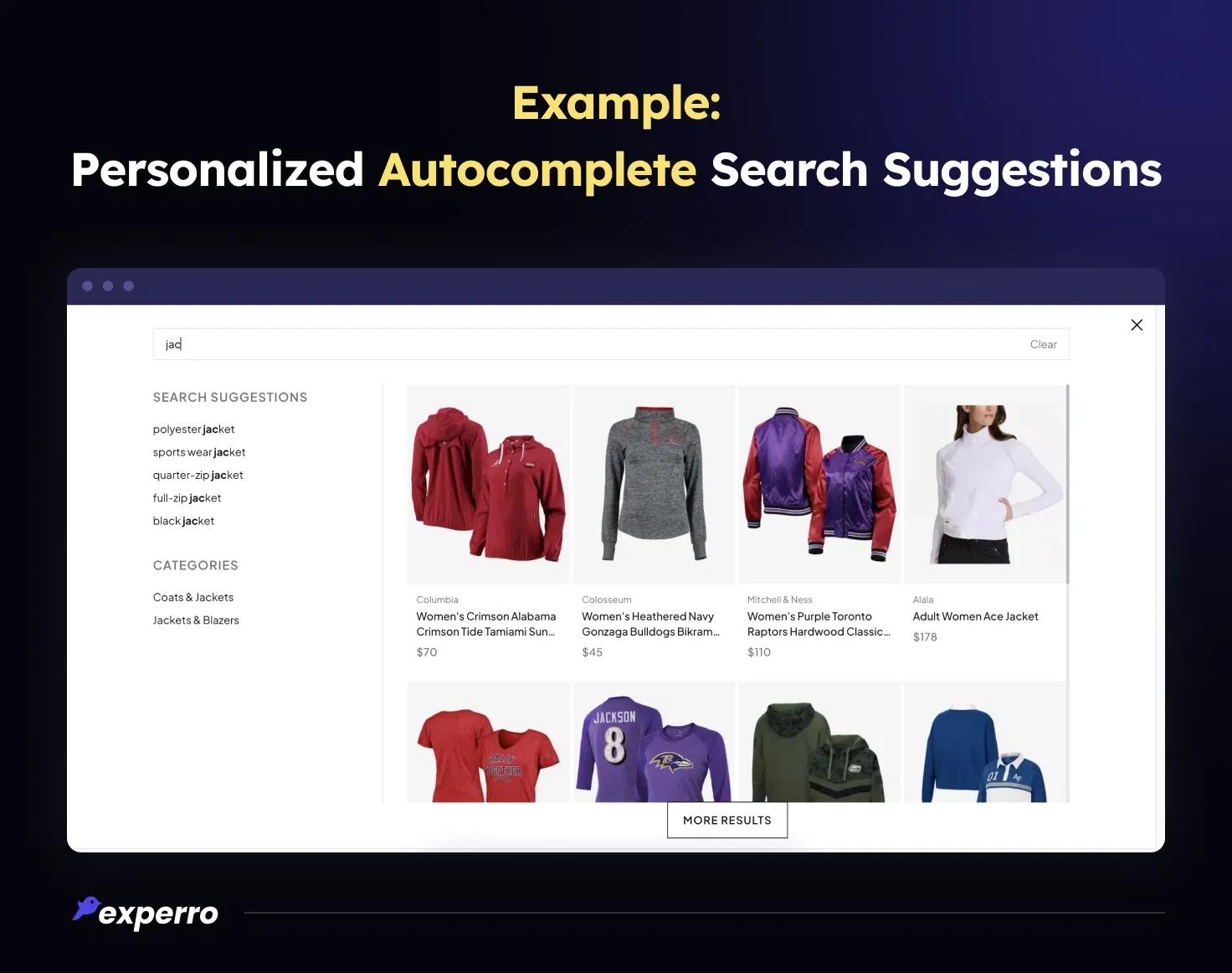
As shown in the image, the user typed "jac" in the search bar, and the system instantly displayed personalized autocomplete suggestions like "jackets" and other related items.
This smart search autocomplete feature reduces search effort and boosts product discovery, leading to higher user satisfaction and increased sales.
These suggestions are tailored based on the user’s previous searches and preferences, helping shoppers quickly find what they’re looking for while enhancing their overall browsing experience.
The importance of personalized search in eCommerce is clearly visible through the above examples. Now, let’s learn more about the benefits it offers to businesses.
Why Search Engine Personalization Matters for Businesses?
In today’s digital world, customers see a lot of information, so businesses must stand out by offering real-time search personalization experiences.
Implementing website personalized search strategies can significantly impact key business metrics, driving growth and customer satisfaction.
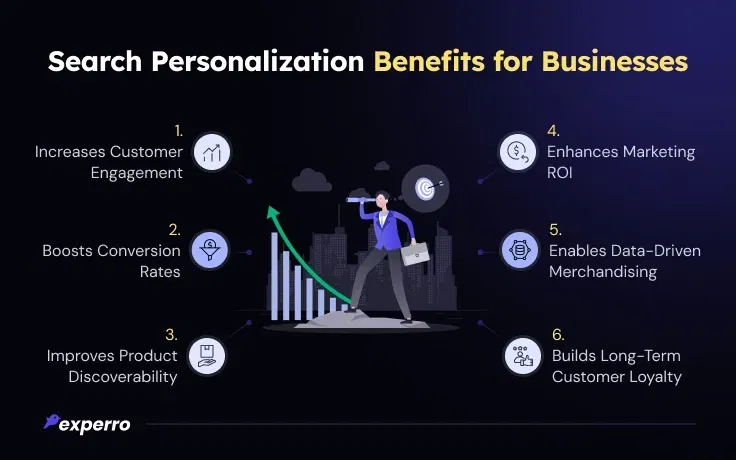
1. Increases Customer Engagement
eCommerce companies can foster deeper connections by delivering content that resonates with individual users and encourages prolonged interaction with their platforms. This enhances user satisfaction and promotes a wider range of products.
2. Boosts Conversion Rates
Tailored search results guide users more efficiently to products or services they are interested in, reducing friction in the purchasing process. This streamlined experience uses generative AI for conversion rate optimization, helping shoppers find what they need faster and more confidently.
3. Improves Product Discoverability
Gen AI-powered search ensures that products align with user preferences, making it easier for customers to discover items they might not have found through traditional search methods.
This not only enhances user satisfaction but also promotes a wider range of products.
4. Enhances Marketing ROI
Targeting users with personalized content that aligns with their interests makes marketing campaigns more effective, leading to a higher return on investment.
Personalization and customizable search strategies ensure ROI of personalized search in retail and the marketing efforts are not wasted on irrelevant audiences.
5. Enables Data-Driven Merchandising
Insights gained from user interactions allow businesses to make informed decisions about product placements, promotions, and inventory management. This data-driven approach ensures that digital merchandising aligns with consumer demand.
6. Builds Long-Term Customer Loyalty
Consistently delivering relevant and personalized experiences fosters trust and loyalty among customers. Over time, search intelligence leads to increased customer retention and advocacy, which are crucial for sustained business growth.
With such strong business impacts, it’s clear that personalization search in eCommerce is a game-changer. Now, let’s see how it also elevates the customer’s journey.
What are the Benefits of Search Personalization for Customers?
Let’s explore how personalized results turn the usual scroll-and-scan into a seamless, satisfying journey.
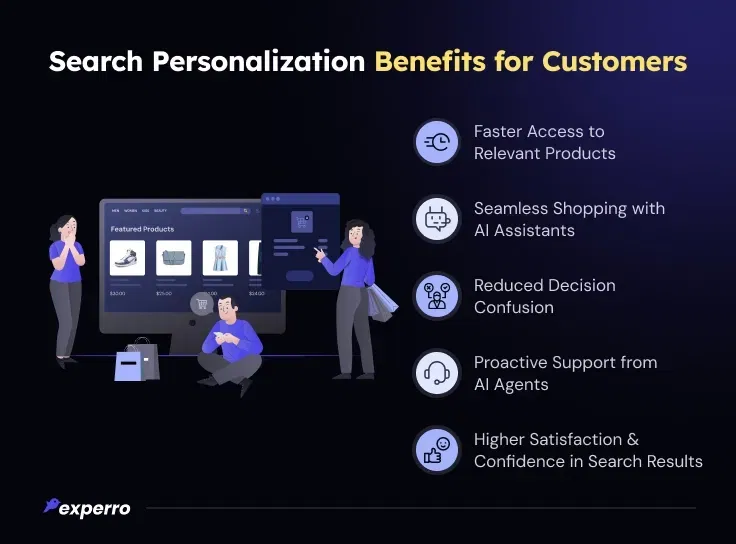
1. Faster Access to Relevant Products
Tailored search results eliminate the need to sift through irrelevant information, allowing customers to find desired products quickly and efficiently.
It reduces browsing time and speeds up decision-making, especially during time-sensitive shopping. By improving search relevance, users are shown what matters most to them — right when needed.
2. Seamless Shopping with AI Assistants and Smart Interfaces
Integration of AI-driven search personalization in eCommerce provides users with intelligent assistants that understand and anticipate their needs, offering a seamless shopping experience.
From suggesting items based on preferences to guiding them through product categories, smart interfaces paired with eCommerce filters reduce friction.
This level of interaction feels connected with the help of natural language processing, like having a personal shopper online 24x7.
3. Reduced Decision Confusion
By presenting curated options that align with user preferences, eCommerce personalized search engines reduce the overwhelm often associated with decision-making, leading to more confident purchases.
It filters out noise and shows only the most relevant products, cutting through choice paralysis. Leveraging detailed product attributes, the system helps users quickly compare and decide what suits them best.
4. Proactive Support from AI Agents During Search
AI-based search personalization enables real-time assistance, guiding users through their search journey and addressing queries proactively, enhancing overall satisfaction.
These smart AI agents offer suggestions, reminders, and even upsell opportunities without disrupting the flow. As a result, users no longer feel abandoned when search results don’t align with their needs.
5. Higher Satisfaction and Confidence in Search Results
When users consistently receive relevant and accurate results, their trust in the platform naturally increases, leading to higher satisfaction and likelihood of repeat engagement.
They’re more likely to complete purchases and return for future requirements. This is the power of hyper-personalization that helps create unique, dynamic search experiences for each individual user.
Together, all these benefits empower your eCommerce store to deliver a faster, smarter, and more engaging shopping experience that drives real business growth.
Create seamless shopping with personalized enterprise search!
Challenges in Implementing Personalized Search Systems
While the benefits are substantial, implementing personalized search systems comes with its set of challenges.
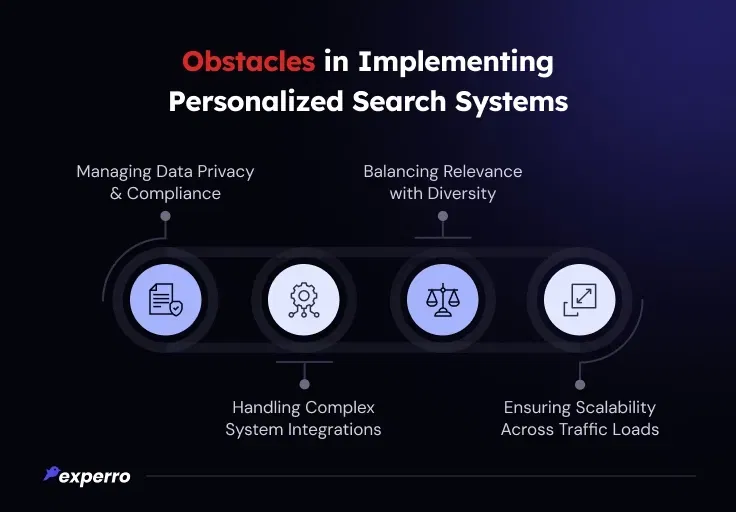
Let's explore some issues with personalized search in detail:
1. Managing Data Privacy and Compliance
Collecting and utilizing user data necessitates strict adherence to privacy regulations and ethical standards. Your business must ensure transparency and obtain proper customer consent to maintain trust.
To address this, Experro employs robust data governance frameworks and advanced consent management to ensure compliance with global privacy standards, safeguarding user information.
2. Handling Complex System Integrations
Integrating personalized search for website functionalities into existing systems can be technically challenging, requiring seamless coordination across various platforms.
To make this easier, Experro offers flexible APIs and integration tools that simplify the incorporation of personalized search features into diverse tech ecosystems.
3. Balancing Relevance with Diversity
Over-personalization qualifies as bad personalization and this can lead to a narrow range of content, limiting user exposure to new or diverse options. Striking the right balance is crucial for a holistic user experience.
To solve this, Experro's eCommerce searchandising algorithms are designed to maintain a balance between relevance and diversity, ensuring users receive personalized yet varied content.
4. Ensuring Scalability Across Traffic Loads
As user bases grow, maintaining the overall operational efficiency and responsiveness of personalized enterprise search systems becomes increasingly complex.
To overcome this, Experro's scalable infrastructure supports personalization at a scale, ensuring consistent performance without compromising on speed or accuracy.
Now that we have learned about the pros and cons of personalized search, let’s find out how to measure personalized search results.
How to Measure Personalized Search Performance?
Assessing the effectiveness of personalized search involves analyzing various metrics that reflect user engagement and satisfaction.
Key performance indicators include:
- Click-Through Rate (CTR): Measures the percentage of users who click on a search result, indicating relevance.
Formula: (Total Clicks / Total Impressions) × 100)
- Conversion Rate: Tracks the proportion of users who complete a desired action, such as purchasing.
Formula: (Conversions / Total Visitors) × 100
- Bounce Rate: Indicates the percentage of users who leave the site after viewing only one page, reflecting content relevance.
Formula: (Single Page Visits / Total Visits) × 100
- Average Session Duration: Measures users' average time on the site, providing valuable insights into engagement levels.
A commonly used formula to evaluate search effectiveness is the NDCG, which assesses the quality of search rankings based on user satisfaction.
NDCGp = DCGp / IDCGp
Where:
NDCG - Normalized Discounted Cumulative Gain
DCG - Discounted Cumulative Gain
IDCG - Ideal Discounted Cumulative Gain
Upgrade to Gen AI-powered Search Personalization with Experro!
What Makes Experro’s eCommerce Search Personalization Stand Out?
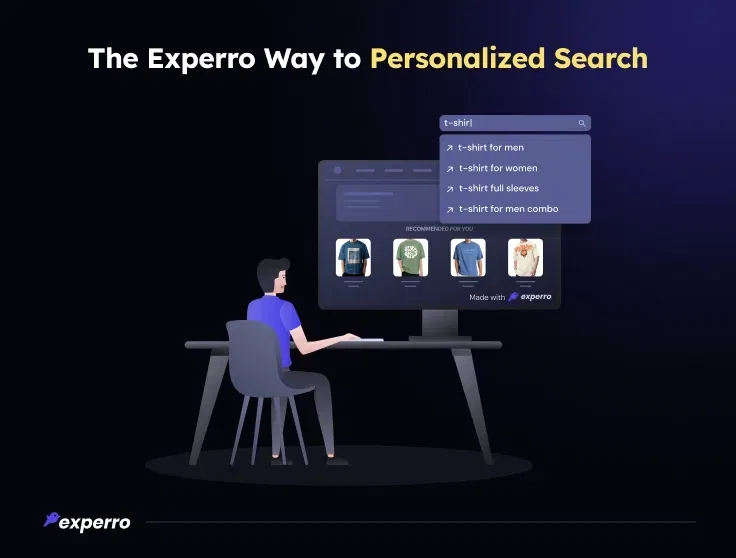
Experro sets itself apart with a tightly integrated approach to Gen AI-powered search, helping brands deliver search experiences that feel intuitive, relevant, and personalized from the first click.
Combined with AI-powered recommendations, Experro offers smart, personalized suggestions that guide shoppers and improve engagement.
Experro as a personalized search platform unifies your data and tools to deliver consistent, search experiences that are faster, more relevant, and optimized for conversions.
Conclusion
Site search personalization solutions for eCommerce aren’t a nice-to-have anymore — it’s buyer’s expectation. Customers demand faster, more relevant results tailored to their preferences. Businesses that fail to deliver risk falling behind.
But those that embrace AI-driven, Experro personalized search can increase conversions, drive loyalty, and significantly enhance the digital shopping experience.
Experro helps you go beyond basic search by combining AI-powered relevance, merchandising control, and smart recommendations - all in one flexible platform.
Ready to turn your search into a growth engine? Connect with our experts to explore how.
FAQs
What is the goal of search personalization?
To deliver highly personalized search results that are the most relevant to each individual user based on their preferences, behavior, and context, ultimately enhancing engagement and conversions.
It ensures that customers see results tailored specifically to them, improving both user satisfaction and the likelihood of purchase.
How is AI used in eCommerce search personalization?
AI analyzes massive amounts of user data — such as past search behavior, clicks, search history, and even time of day to predict and deliver the most relevant search results in real time.
It adapts continuously, using machine learning models that refine search outcomes as more data becomes available.
How can businesses implement personalized searches?
It starts with choosing the right platform like Experro, which gives your business the power of AI, real-time data, and smart merchandising tools to make your search experience truly personal.
Here’s how you can get started:
- Connect your product catalog and customer data with Experro to build a solid foundation for personalized search.
- Track on-site behavior such as clicks, searches, and past purchases using Experro’s built-in analytics.
- Set up personalized search merchandising rules and conditions for tailored experiences.
- Continuously monitor and optimize performance with Experro’s real-time insights and personalization controls.
Can personalization go too far?
Yes, limited results can limit product discovery or create filter bubbles, where users only see what algorithms think they want. That’s why it’s important to balance relevance with diversity.
To maintain this balance:
- Blend personalized search algorithms with rule-based logic.
- Include new or trending products even if not part of web history.
- Use fallback mechanisms for new users with limited data.
What kind of ROI can I expect from personalized search and discovery?
While it depends on your industry and implementation quality, many businesses report noticeable improvements in engagement, conversions, and customer loyalty after adopting personalized search and discovery.
Over time, these gains can significantly increase average order value and customer lifetime value.
How does Experro’s search personalization compare to others?
Experro delivers AI-powered search personalization designed for speed, accuracy, and scalability.
Here are the features to look for in search personalization tools:
- Built-in merchandising layer that allows precise control over product visibility and rankings.
- Real-time content indexing, ensuring users always see the most current inventory or content.
- Omnichannel personalization that adapts across web, mobile, and other digital touchpoints seamlessly.
- No-code rule engine, empowering marketers to craft personalized experiences without developer support.
- Headless-ready architecture, making integration flexible with modern tech stacks.
Pallavi Dadhich
Content Writer @ ExperroPallavi is an ambitious author recognized for her expertise in crafting compelling content across various domains. Beyond her professional pursuits, Pallavi is deeply passionate about continuous learning, often immersing herself in the latest industry trends. When not weaving words, she dedicates her time to mastering graphic design.
What's Inside
- What Is Search Personalization?
- How Does eCommerce Personalized Search Work?
- AI-Powered Search Personalization vs. Traditional Search
- What Are the Examples of Personalized Search in Action?
- Why Search Engine Personalization Matters for Businesses?
- What are the Benefits of Search Personalization for Customers?
- Challenges in Implementing Personalized Search Systems
- How to Measure Personalized Search Performance?
- What Makes Experro’s eCommerce Search Personalization Stand Out?
- Conclusion
Subscribe to Our Newsletter!
Get the latest insights delivered straight to your inbox.


